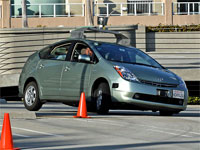
Top stories






More news














Experts believe that due to the system's accuracy, driverless vehicles could help reduce the number of fatalities that occur on the roads daily. The extent of motor vehicle accidents remains a serious problem in South Africa and is most often the result of human error. Consequently, a driverless system could help to eradicate careless and negligent driving behaviour, thereby reducing the number of accidents. If this is the case, and fewer accidents occur, then the cars could also be built lighter, allowing for less fuel consumption.
If the risks posed by driverless vehicles do prove to be less than those posed by traditional vehicles, the insurance premium charged should also reduce. In theory, this would make the industry even more competitive, forcing insurance companies to include additional value-added services to make their respective offerings more attractive. However, while the traditional risks posed by driver vehicles may be substantially mitigated, the reality is that it will take a long time for cars to be introduced with the new driverless system and to be able to drive the streets with absolute autonomy. Compatibility of all vehicles to enable constant cross-communication with each other is the crux here, as otherwise the sizeable benefits offered by such a system would soon to be obsolete.
As a result, a major concern for any insurance company that opts to provide a reduced premium in response to the driverless system being implemented is that a sluggish take-up of this technology would mean that the risks posed by other drivers on the roads would remain as rife as before.
Even with a high take-up of driverless vehicles, the introduction of such technology would mean that insurance contracts would certainly have to be revisited. With an insurance policy being a contract between the insurer and the insured, certain terms and conditions may need to be tweaked in order to ensure that comprehensive cover is not compromised.
Exclusions, such as driving under the influence of alcohol, may no longer need to be applied. However, one of the most contentious legal issues may be that of third-party claims. The fact that you are no longer driving the car, but rather the car is driving itself, raises a number of questions: Can someone still be sued in his personal capacity? Would the owner or driver of the vehicle now assume the negligent position of the vehicle? The qualifying criteria for negligence to exist may now have to question: Would the reasonable person (vehicle) have foreseen the consequence of his (its) actions? Would the reasonable vehicle have taken the necessary steps to safeguard against this consequence? And, lastly: Did this vehicle take the necessary steps to safeguard against such a consequence?
The introduction of this new mode of transport would also require transport laws to be revised. This will include legislation regarding speaking on the cellphone whilst driving, licensing of vehicles and drivers, as well as the possible impact on claims submitted against the Road Accident Fund.
The principle behind driverless technology is very positive and, so far, the technology appears to be proving a success. However, the phasing in of this type of technology will take a long time, especially in emerging markets where older cars remain on the roads for far longer.